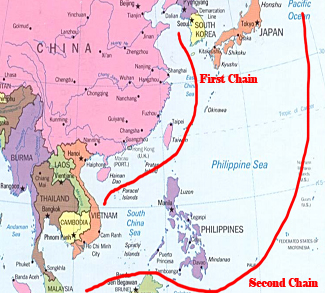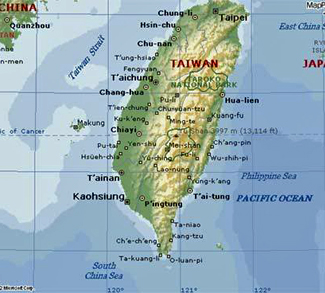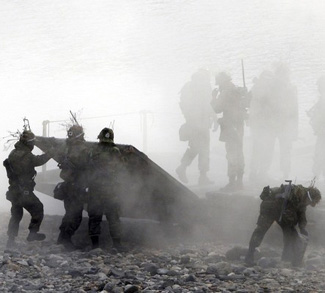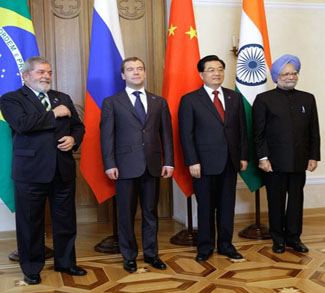FORECAST
A confidential report that was mistakenly posted on the internet by the US Office for Naval Intelligence suggests that the People’s Liberation Army Navy (PLA Navy) has been making rapid progress on a variety of modern weapon platforms.
In recent years, the PLA Navy’s strategic focus has started to creep outwards from China’s immediate coastal waters- the ‘first island chain’- and into the South China Sea down towards the Strait of Malacca, the Philippine Sea beyond Okinawa, and the Sea of Japan- the ‘second island chain.’ The PLA Navy’s interest in the second island chain is driven by two overarching strategic goals: reunification with Taiwan and the defense of overseas shipping routes.
According to the leaked intelligence report, the PLA Navy has been strengthening its hand in the event of a future conflict with the United States over Taiwan. Its’ modernization program has favored anti-access and anti-surface warfare while simultaneously nurturing the command, control, communications, computers, intelligence, surveillance, and reconnaissance (C4ISR) structures required for joint operations. The PLA Navy now boasts 53 diesel and 9 nuclear submarines, and an ever-increasing number of them are equipped with Russian SS-N-22 Sunburn and SS-N-27 Sizzler anti-ship cruise missiles (ASCM). These ASCMs, as well as on-shore anti-ship ballistic missiles, are both able to perform mid-course ballistic corrections that are aimed at thwarting some anti-ballistic missile defense platforms. Without a doubt, they raise the threat level faced by US aircraft carriers operating in the waters around Taiwan.
China’s ever-increasing dependence on energy imports creates a global strategic interest that in turn requires the development of a capacity for naval force projection. In response to this glaring need, the PLA Navy is procuring ‘blue sea’ auxiliary vessels that can support operations far from home. These include: anwei class hospital ships and fuchi class replenishment oilers.
Of course, the linchpin of naval force projection and Chinese control of the second island chain is an aircraft carrier. The PLA Navy purchased a Russian-produced Kuznetsov class aircraft carrier in 1998, and it has been undergoing renovations since 2002. According to the leaked report, this carrier will be deployed in a primarily training role sometime around 2012, and the PLA Navy should have a domestically-produced aircraft carrier sometime after 2015. The Chinese government has consequently started to inquire about purchasing a batch of Russian Su-33 carrier-borne fighters to kick start a Chinese carrier aviation program.
While the PLA Navy has made progress in its move from quantity to quality, it still has a long way to go in developing the C4ISR structures and professional force that are required to launch effective joint operations. So far, the modernization program has been highly targeted, meaning that gains for the PLA Navy’s submarine fleet have come at the expense of other areas such as large surface ships. Over time, ongoing modernization programs will smooth out these inequalities and Chinese military power will be able to challenge American influence in East Asia.
In sum, while the PLA Navy is still a long way from matching up against Japan’s Maritime Self Defense Force or the US Navy, the balance of forces in the region is changing, and it will continue to change over the next two decades. Even now, the PLA Navy has developed an anti-access capability that is sophisticated enough to influence American decision-making processes on Taiwan. In another 10-15 years, America’s qualitative military advantage will be eroded to the point that a conflict over Taiwan would jeopardize several large ships and aircraft carriers.
SUMMARY OF EVENTS: January 25th – February 1st 2010
NORTH AMERICA
United States
The US will take on a broader range of military responsibilities, including defending space and cyberspace, in spite of growing pressure on budgets, a long-awaited administration report is set to conclude on Monday.
Ben Bernanke has been approved to serve a second four-year term as chairman of the US Federal Reserve.
LATIN AMERICA
Brazil
Brazil, Russia, India and China have issued a record amount of equity since the start of the year, as the so-called Bric countries have rushed to take advantage of increased appetite for emerging market assets.
EUROPE
United Kingdom
Control over some of Afghanistan’s provinces is to be handed over to the Afghan government by the end of 2010, according to foreign ministers attending a one-day international conference in London.
The London conference on Afghanistan is likely to add five more years to the serving time of British troops in the war-torn country, according to a leaked document.
Jack Straw rejected advice in the run up to war that invading Iraq without UN backing would break international law, the Iraq inquiry heard.
MIDDLE EAST
Yemen
The Yemeni government has turned down a truce offer from the country’s Houthi fighters.
Iran
The US Senate has backed legislation allowing President Barack Obama to extend sanctions against Iran.
Iran has hanged two men over widespread protests that followed the country’s disputed presidential election in June last year, an Iranian news agency has said.
President Mahmoud Ahmadinejad hinted on Sunday that Tehran would itself pursue uranium enrichment to higher levels if the West spurns its offer of a phased fuel swap, promising Iranians “sweet” news soon.
SOUTH ASIA
Pakistan
The Pakistan Taliban has dismissed reports on state television suggesting that Hakimullah Mehsud, the head of the group, had been killed and subsequently buried.
A suspected U.S. drone crashed in Pakistan’s lawless tribal area near the Afghan border Sunday, a rare mishap for a program Washington has increasingly relied on to kill Taliban and al-Qaida militants, said intelligence officials and a local resident.
Afghanistan
Afghan President Hamid Karzai says he will propose lifting UN sanctions against some Taliban leaders at a summit in London later this week.
Afghanistan’s neighbours and Turkey Tuesday backed President Hamid Karzai’s plan to offer incentives to Taliban fighters to make them lay down arms, in a joint statement issued after talks here.
Hamid Karzai, the Afghan president, has said his country must reach out to its “disenchanted brothers” in an effort to stabilise the war ravaged nation.
EAST ASIA
North Korea
U.N. Secretary-General Ban Ki-moon is to send a special envoy to North Korea next week, his office said Sunday, amid international efforts to bring Pyongyang back into disarmament talks on its nuclear weapons programme.
North Korea on Thursday fired artillery shells near the disputed maritime border with South Korea for a second day, media reports said.
North Korea reiterated that it is unwilling to return to multilateral nuclear disarmament talks while the country is subject to UN sanctions.
China
Envoys of the exiled Tibetan spiritual leader, the Dalai Lama, are in Beijing to resume talks with China’s government after a break of 15 months.
The US has defended a proposed weapons sale to Taiwan following a furious response from China.
China has intensified efforts over the past year to control what the media can say, a report by the International Federation of Journalists (IFJ) says.
A mistake by a US Navy intelligence official has given the world an unexpected peek into the secret world of China’s navy. The US Office for Naval Intelligence (ONI) committed the blunder of posting, on an open website, the agency’s assessment of the state of the PLA Navy. Before the ONI could rectify this indiscretion by pulling off the report, it had been downloaded and posted on a publicly accessible website.
AFRICA
Libya
Libya’s leader Muammar Gaddafi has failed in his bid to stay on as president of the African Union for another year.
Sudan
A vote for independence in oil-rich Southern Sudan’s referendum next year could be catastrophic, the African Union’s top diplomat has warned.
Sudan’s ruling National Congress Party said on Wednesday it would support former foe Salva Kiir for president of the semi-autonomous south in April elections in an attempt to revive a faltering partnership.
Somalia
The European Union has agreed to send a team to help train up to 2,000 Somali troops, who are battling a long-running insurgency by Islamist militants.




